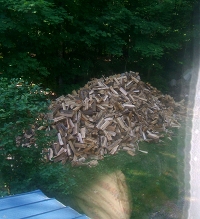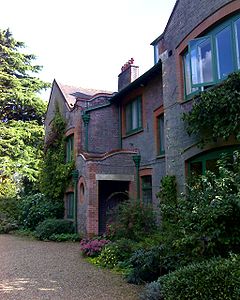It is a lovely morning out there this morning. Sunshine. Birds singing. Dump trucks dumping gravel next door, ah the sounds of progress.
Attila has been busy moving his mountain, he works till dark every night after dinner.
This past week I’ve been busy updating web sites and tackling my own mountains, mountains of telephone calls and faxed documents. Sometimes, bureaucratically, everything seems to go haywire. A government agency lost a cheque I’d sent; they cashed it but didn’t record that process properly and were after me for another cheque. So, many telephone calls later they acknowledged the cheque they cashed and things have been set right. I knew it would work out, however, it was a very time consuming issue. This past week has seen other issues arise that were equally time consuming and even less important in the general scheme of things. Still, the issues had to be dealt with, which is what I’ve been doing every evening for the last week.
Attila and I have also needed to consider an invitation to a hearing by the Township Committee of Adjustment to grant right-of-way over an existing private lane way (not ours but very close to our property). This is at our country house. What this actually means is that someone is planning a big building project near us and want a guarantee that they will have road access before they make this huge investment. It means, for us, more traffic, another new neighbour and we are not going to oppose it. In the long term it will enhance the value of our property, or so we think.
There is some development activity going on around us, most of it by speculators buying up tracts of land they feel will become more valuable over time, mostly waterfront. Who knows what the future will bring. We are grateful we own enough property, which is not waterfront, to maintain a small bit of forest that will not be developed. It won’t save the world, but it will keep our home surrounded by trees and wildlife.
The process of displacement of the local population in cottage country is as effective as the Scottish Clearances, although much slower, almost invisible and not as brutal. As the demand for waterfront property increased, the prices rose as did the taxes. Eventually, families with property on the more popular lakes were forced to sell because they simply could not pay the taxes on such valuable property. They did gain financially, but their ties to the community were lost. Slowly, since the end of WWII there has been a shift in ownership of waterfront properties in these townships; from local families who had been in the area since the first land grants were made available, to urban based families seeking a vacation property.
What exists now are increasingly distinct segments of population. On the one hand, there are the locals, who consist of entrepreneurs owning businesses that serve the seasonal and affluent summer population and the locals who work for the entrepreneurs, usually at very low rates of pay and for only the summer season. There is a lot of poverty in the area, which is almost invisible as it exists well away from the waterfront properties. On the other hand, there are the seasonal residents, who either vacation in their seasonal homes or spend only the summers here and are usually but not always retired and winter in warmer climates. Occasionally people reside year round in their cottages, this seldom last more than a season or two, the winters are harsh and bear no resemblance to the holiday atmosphere of the summer months.
The prices at the local shops are meant for those who can afford to buy the best, and who don’t worry about the price. The vast majority of the local population does not need the best, nor can they afford it. So, the local working population has to leave the area to find food and other goods and services that they can afford. I think you get the drift here, slowly but surely this area is losing its vibrancy and ability to support a working population of families. The solution to this social issue has been to bring in large numbers of seasonal workers from the third world to work here, as they can live in residences and go home at the end of the holiday season. They are wonderful people, for the most part, but have no long-term commitment to the community, as their real lives take place far, far away.
When Annie and Frank came to visit us some years ago, from England, they were shocked at the price of fresh fruit; as compared to London, Ontario. They had stopped at a local shop to buy us a basket of fresh fruit, as a treat. Even they, with two urban jobs, could not afford to buy fruit at this shop, so they settled for one plum each for the four of us.
The grocery store here is kept open during the winter as a courtesy to the local population. Their sales for the winter are less than the sales made on one long weekend in the summer. They are making a real contribution to the community by staying open, and there are a few local business owners who really make an effort to keep the community viable.
This juxtaposition of privilege and want make for strange politics and unbalanced communities, in my opinion.
Of course, visitors to the area see none of this, and if I were a visitor I would not see it either. I am certain that the visitors at the G8 meetings were totally unaware of the poverty that exists in the area, and I’m not convinced they would care if they did know. Their world “ain’t broke” so their not fixing it, again in my opinion.
Worldly Distractions
Weather
18 °C
Condition: Sunny
Pressure: 101.4 kPa
Visibility: 16 km
Temperature: 18.0°C
Dewpoint: 9.7°C
Humidity: 58 %
Wind: NNE 11 km/h
Quote
“The reasonable man adapts himself to the world; the unreasonable one persists in trying to adapt the world to himself. Therefore all progress depends on the unreasonable man.”
George Bernard Shaw
1856 – 1950
Note
George Bernard Shaw
“…an Irish playwright and a co-founder of the London School of Economics. Although his first profitable writing was music and literary criticism, in which capacity he wrote many highly articulate pieces of journalism, his main talent was for drama, and he wrote more than 60 plays. Nearly all his writings address prevailing social problems, but have a vein of comedy which makes their stark themes more palatable. Shaw examined education, marriage, religion, government, health care, and class privilege.
He was most angered by what he perceived as the exploitation of the working class. An ardent socialist, Shaw wrote many brochures and speeches for the Fabian Society. He became an accomplished orator in the furtherance of its causes, which included gaining equal rights for men and women, alleviating abuses of the working class, rescinding private ownership of productive land, and promoting healthy lifestyles. For a short time he was active in local politics, serving on the London County Council…
Influenced by his reading, he became a dedicated Socialist and a charter member of the Fabian Society, a middle class organization established in 1884 to promote the gradual spread of socialism by peaceful means. In the course of his political activities he met Charlotte Payne-Townshend, an Irish heiress and fellow Fabian; they married in 1898. The marriage was never consummated, at Charlotte’s insistence, though he had had a number of affairs with married women; Peters posits that Shaw was a repressed homosexual. Shaw declined to stand as an MP, but in 1897 he was elected as a local councillor to the London County Council as a Progressive.
In 1906 the Shaws moved into a house, now called Shaw’s Corner, in Ayot St. Lawrence, a small village in Hertfordshire, England; it was to be their home for the remainder of their lives, although they also maintained a residence at 29 Fitzroy Square in London…